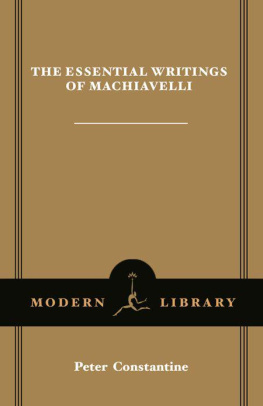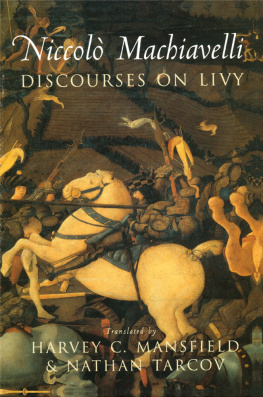Introductory
Since conspiracies are of such dangerous consequence alike to princes and to private persons, I cannot well omit to discuss their nature, for it is plain that many more princes have lost their lives and their states in this way than by open war, because it is given to but few to make open war on a prince, whereas anyone can conspire against him. There is, on the other hand, no enterprise in which private persons can engage more dangerous or more rash than is this, for it is both difficult and extremely dangerous in all its stages. Whence it comes about that, though many conspiracies have been attempted, very few have attained the desired end. Hence, in order that princes may learn how to guard against these dangers, and that private persons may think twice before undertaking them and may learn, instead, to be content with life under the regime which fate has placed over them, I shall speak of conspiracies at length, omitting nothing of importance that is relevant either to a prince or to a private person. There is, in fact, a golden saying voiced by Cornelius Tacitus, who says that men have to respect the past but to submit to the present, and, while they should be desirous of having good princes, should put up with them of whatever sort they may turn out to be. And unquestionably those who act otherwise usually bring disaster both upon themselves and upon their country.
In starting to deal with this topic the first thing to be considered is against whom conspiracies are formed. It will be found that they are formed either against ones fatherland or against a prince. I propose here to discuss both these types, for of conspiracies formed with a view to handing over a town to the enemy besieging it or conspiracies which for one reason or another resemble this, enough has been said elsewhere.
Causes
We shall deal in the first part of this discourse with conspiracies against a prince, and shall inquire first as to their causes, which are many. There is, however, one which is much more important than all the rest. This consists in the universal hatred a prince may evoke, for when a prince has aroused such universal hatred it is to be expected that there will be certain persons to whom he has given greater offence and that they will seek vengeance. This desire will be intensified by the universal ill will which they notice has been aroused against him. A prince, therefore, should avoid incurring these personal reproaches, and since what he has to do in order to avoid them has been discussed elsewhere I shall refrain from discussing it here: I mention it because, if he does guard against this, the mere giving of offence to individuals will evoke less hostility. The reason is, first, that one rarely comes across men so indignant at an unjust act as to endanger themselves to such an extent by seeking vengeance; and secondly, that, should they actually be inclined to do this and have the requisite power, they are restrained by the universal goodwill which they see that the prince enjoys.
Injuries may affect either a mans property, his life or his honour. The threat of bloodshed is more dangerous than is the shedding of blood. To threaten to shed blood is, in fact, extremely dangerous: whereas to shed it is attended with no danger at all, for a dead man cannot contemplate vengeance, and those that remain alive usually leave you to do the contemplating. But a man who has been threatened and sees that he must of necessity either do something or be for it, has been turned into a real menace for the prince, as we shall cite cases presently to show.
Prescinding from the case in which action is imposed by necessity, injuries affecting a mans property or honour are the two things which give men greater offence than anything else, and against them the prince should be on his guard, for he can never so despoil anyone but that there will remain to him a knife with which to wreak vengeance. Nor can he deprive a man of his honour to such an extent that his mind will cease to be set on vengeance. And of the honours of which men may be deprived, that which imports most is a womans honour, and, after that, contempt for a mans person. It was this that caused Pausanias to take up arms against Philip of Macedon; and this that has caused many others to take up arms against many other princes. In our day Lucio Belanti would not have been moved to conspire against Pandolfo, the tyrant of Siena, if he had not given him his daughter to wife and then taken her away again, as we shall relate in due course. The chief cause which led the Pazzi to conspire against the Medici was the inheritance of Giovanni Bonromei of which they had been deprived by the Medicis orders.
Another cause, and this a very powerful one, that makes men conspire against a prince, is the desire to liberate their fatherland of which a prince has seized possession. It was this that caused Brutus and Cassius to turn against Caesar; this that led to many other conspiracies, against Phalaris, Dionysius and against other usurpers of their countrys rights. Nor can any tyrant prevail over this spirit, except by discarding his tyranny. And since one does not find tyrants doing this, one finds few who have not come to a miserable end. Hence the verse of Juvenal:
To Plutos realm few kings unscathed descend,
Nor tyrants oft escape a sticky end.
One-man conspiracies
The dangers involved in conspiracies, as I have said above, are considerable, and go on all the time, for in a conspiracy dangers crop up alike in forming the plot, in carrying it out, and as a result of its having been carried out. Plots may be formed by one conspirator, or by several. If by one person only, it cannot rightly be called a conspiracy. Rather it is a firm resolve on the part of some individual to kill the prince. Of the three dangers conspiracies entail, a one-man conspiracy lacks the first. For no danger can arise before the time for action comes, since no one else being privy to the secret, there is no danger of the plot being carried to the ears of the prince. To make a resolve of this kind lies within the competence of anybody whatsoever, be he great, small, noble or insignificant, intimate or not intimate with the prince. For anyone is allowed at some time or other to speak to the prince, and anyone who gets the chance of speaking to him, gets a chance to relieve his feelings. Pausanias, of whom we have already spoken several times, killed Philip of Macedon as he was on his way to the temple with a lot of armed men about him and his son on one side and his son-in-law on the other. The former, however, was a nobleman and an acquaintance of the prince. [But there are others.] A poor, miserable Spaniard stuck a dagger in the neck of Ferdinand, king of Spain, and, though the wound was not fatal, it shows us that a man of this type may have both the intention and the opportunity of doing such a thing. A dervish, or Turkish priest, struck at Bajazet, the father of the present Turk, with a scimitar. He did not kill him, but he certainly had the intention and the opportunity of so doing. One finds plenty of people, I think, who would like to do such things, for the intention is attended neither with penalty nor danger of any kind. Yet there are but few who actually do such things, and of those who do, there are very few, if any, who do not themselves get killed in the very act. Hence one does not find men keen on going to certain death. But let us leave these one-man plots and turn to conspiracies involving several people.
















